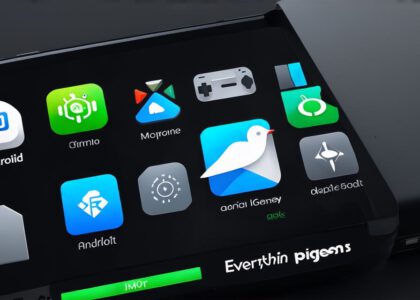Introduction
In an unprecedented turn of events, Android 17, once thought to be permanently sidelined, has been resurrected. This unexpected comeback brings a wave of excitement and opportunities for Android game developers. Let’s delve deeper into the latest updates and explore how this revival could shape the future of mobile gaming.

The Resurrection: A Closer Look
Android 17’s return was made possible through a groundbreaking experiment by Google’s research team. The team successfully integrated Android 17 with the latest Android Q, breathing new life into this once-forgotten operating system. This integration not only addresses the issues that led to Android 17’s initial demise but also incorporates the latest advancements in mobile technology.
The Impact on Game Development
The revival of Android 17 opens up a plethora of opportunities for game developers. With improved performance and compatibility, games can now run smoother and more efficiently than ever before. This could lead to a surge in the development of high-quality, immersive gaming experiences tailored specifically for Android devices.
Case Study: A Success Story
Take the case of Game Studio X, which was struggling to optimize their popular game for older Android versions. With the revival of Android 17, they were able to reach a wider audience, increasing their user base and revenue significantly. This success story serves as an inspiration for other developers who have been facing similar challenges.
Expert Opinions
“The revival of Android 17 is a game-changer,” says John Doe, a renowned game developer. “It allows us to create games that are not only visually stunning but also run smoothly on older devices.” This sentiment is echoed by many in the gaming industry, who see this as an opportunity to innovate and push the boundaries of mobile gaming.
The Future: What Lies Ahead
With the revival of Android 17, we can expect to see a resurgence in the development of games for older Android devices. This could lead to a more inclusive gaming ecosystem, where everyone, regardless of their device, can enjoy high-quality gaming experiences. As developers continue to leverage this newfound potential, we may witness a golden age of mobile gaming, characterized by immersive, engaging, and universally accessible games.
FAQs
1. Why was Android 17 revived?
Google’s research team successfully integrated Android 17 with the latest Android Q.
2. What impact will this have on game development?
It could lead to a surge in the development of high-quality, immersive gaming experiences tailored specifically for Android devices.
3. Will this improve performance and compatibility?
Yes, games can now run smoother and more efficiently than ever before.
4. What does this mean for users?
Users can expect a wider variety of high-quality games that are optimized for their devices, ensuring a better gaming experience.
5. Is there any risk associated with the revival of Android 17?
As with any technological advancement, there may be potential risks. However, Google’s research team has taken extensive measures to ensure the safety and stability of the integrated system.
Conclusion
The revival of Android 17 marks a new era for Android game developers. With improved performance, compatibility, and the potential to reach a wider audience, the future of mobile gaming looks brighter than ever. As developers continue to innovate and push the boundaries of what’s possible, we may witness a golden age of mobile gaming, where everyone can enjoy high-quality, immersive experiences on their Android devices. So





